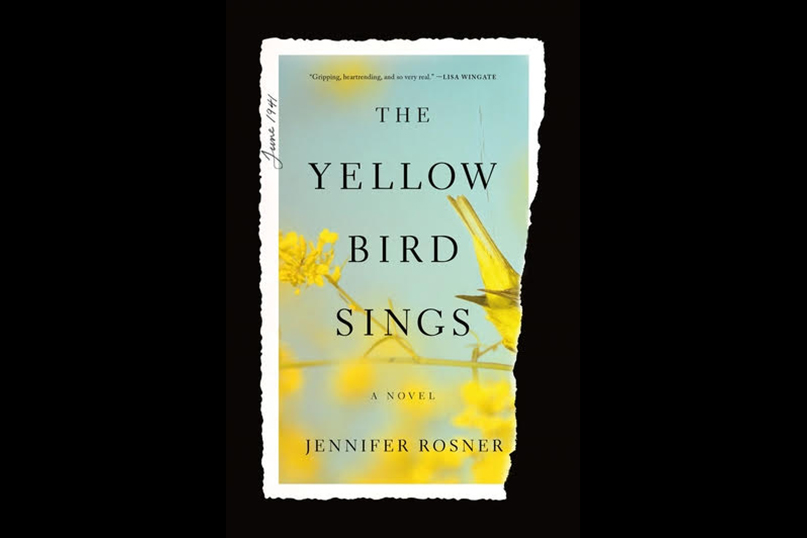
By Stacey Dresner
In her debut novel The Yellow Bird Sings, Weston native Jennifer Rosner writes about a mother and child hiding from the Nazis during World War II. The musical child finds it difficult to stay quiet, so her mother tells her a story of a little girl and her bird, which can sing the songs the girl hears inside of her head.
This story of love and survival is actually the third book penned by Rosner, who lives in Northampton, Massachusetts. In 2010, she wrote a memoir, If a Tree Falls: A Family’s Quest to Hear and Be Heard, about her two daughters being born deaf and the deafness she soon discovered in her family tree. That was followed by an award-winning children’s book, The Mitten String, based on family lore about a deaf mother and the mitten with a string attached that helps her know when her infant needs her.
All three books tell of the powerful love of mothers for their children. But Rosner’s new novel is also about the sacrifices one mother must make to ensure her daughter’s survival – and the important role art plays, even during dangerous and uncertain times.
In The Yellow Bird Sings Roza and her five-year-old daughter Shira hide in a neighbor’s barn while the rest of the Jews in their Polish town are rounded up by the Nazis.
Used to humming the music she hears her grandfather, a violin-maker, play on the wares in his workshop, “Shira hears music and compositions in her head,” Rosner explains.
“She is very musical and she feels music pulsing through her,” she says. “But in the barn she has to be entirely silent, so she conjurs up a bird that can sing her songs for her. The mother, in trying to keep the child still and silent, invents a story about a little girl and her bird. I think that at heart this novel is really about the mother-daughter connection and also about the role of imagination and creativity and beauty and the role it plays in their survival.”
The idea for the book came to Rosner 10 years ago when she was at an event promoting If A Tree Falls.
“I was talking about our daughters and how much we were working with them to vocalize, and celebrating every sound they made. A woman from the audience came up to me afterwards and described her childhood of needing to be completely silent in a barn with her mother for 12 months when she was a girl. I just thought so much about what it must have been like for her to have to be quiet, and also about her mother having to keep her quiet, especially with all of the opposite work we had been doing trying to have our children make sound. And it just stuck with me,” says Rosner.
Rosner began talking to child survivors of the Holocaust to try to understand what they went through during the war.
“Their stories were full of ingenuity and so much resilience, and also emotional hardship and the senses of loss that persisted for 75 years,” Rosner says. “It was very rich and deep and sad material, but also really, kind of uplifting because the people were all so full of life and joy with all that was happening now in their lives.”
Rosner also went to Poland to visit and research a town similar to the one in the book, and a barn where a family had been hidden, as well as other locations that come up later in the story, including Israel where she met Amnon Weinstein, the founder of Violins of Hope, a collection of violins that survived concentrations camps and are now being used for education and are played in concerts around the world.
Rosner was not always a writer.
Raised in Weston, Rosner is a graduate of Columbia University and received her Ph.D in Philosophy from Stanford. She taught philosophy at both Stanford and Mount Holyoke before leaving academia to raise her children. Her daughters, who were six and nine when she wrote her memoir, today are 16 and 19, and are thriving.
Rosner teaches a philosophy course at The Care Center in Holyoke, an organization for economically challenged young women and her work has been published in The New York Times, The Massachusetts Review and The Forward. She has begun a new novel about climate.
“It is in its very infant stages and it’s going to be a fable of sorts and I think it’s going to be about truth and lies and rising water,” she says.
She had planned to be promoting The Yellow Bird Sings now, but with libraries in Massachusetts and Connecticut closed due to the coronavirus outbreak, all of her book events have been cancelled, although she hopes they will be rescheduled in the summer.
While she doesn’t know if she will write about the Holocaust again, that theme is an important one to her.
“I think it’s very important that we are writing and creating all kinds of art about the Holocaust, now more than ever, because of the current climate of antisemitism and all kinds of worrisome things going on in our political world,” Rosner notes. “I think it’s very important to keep working to create art that can reach different audiences and that can bring interest and passion and empathy. I really value all the kinds of art that come out about the Holocaust because I feel really strongly that it contributes to the consciousness.”








 Southern New England Jewish Ledger
Southern New England Jewish Ledger










